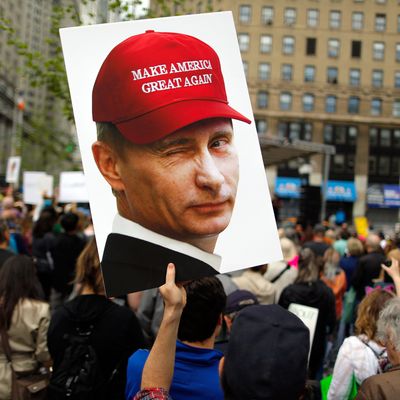
Now that the Washington Post has reported, and President Trump himself confirmed, that special counsel Robert Mueller is investigating Trump for obstruction of justice, Trump’s defense has begun to emphasize the unfairness of the process. “They made up a phony collusion with the Russians story, found zero proof, so now they go for obstruction of justice on the phony story,” tweeted the president. The supposed lack of evidence for any underlying crime for Trump to obstruct has become an article of faith on the right. Andrew McCarthy’s column in the Journal of American Greatness, large portions of which are italicized for emphasis, sarcastically notes, “All that was lacking was—wait for it—actual evidence of collusion.”
What, you might wonder, would count as evidence of Trump colluding with Russian election interference? How about one of his campaign advisers having advance knowledge of the Russian hacking operation? Because that exists. If that’s not enough to count as evidence, what if I told you Donald Trump asked Russia to hack his opponent’s email system and publicize the results in order to help Trump, and it was on video? Because that exists, too.
Watch: All of the times Donald Trump has shown he’s his own worst enemy.
So the evidence for collusion in the email hacking lies right out in the open — just like evidence that Trump fired James Comey to obstruct the Russia investigation, which the president confessed to in an NBC News interview. (Sometimes it seems like this investigation doesn’t even need a special counsel, just a video-montage editor.) But the collusion is almost surely not limited to the planning of the email hack. It seems to run much deeper, into a web of financial ties between Vladimir Putin’s regime and Trump and his closest advisers.
Last July, Franklin Foer first sketched the outline of what looked like Vladimir Putin’s plan to influence American politics through the Trump campaign. Foer described a deep pattern of Russian intervention in other elections in countries like Italy, France, Greece, Bulgaria, Hungary, and Ukraine. (The last was a political-influence operation run by Paul Manafort, who went on to run Trump’s campaign.) A crucial aspect of Putin’s method was covert financial ties. Not only did he give political support to friendly parties, he made the politicians themselves rich.
Trump was highly susceptible to such inducements. His bankruptcies, and habit of refusing to pay his contractors, had made him untouchable by American banks. Trump had grown deeply reliant on shady foreign dictators in general, and Russia in particular, for capital. “Russians make up a pretty disproportionate cross-section of a lot of our assets,” Donald Trump Jr. said in 2008. “We see a lot of money pouring in from Russia.” Trump has worked closely with shadowy Russian mob figures.
Foer expressed his suspicion that Russia had a hand in the still-nascent email hacks, but he described Putin’s intervention primarily through the channel of corruption. “Mercantilist motives likely undergird Trump’s ornate praise of Putin,” he wrote. “[I]t was at just the moment [Trump] came to depend heavily on shadowy investment from Russia that his praise for Putin kicked into high gear.” Foer also drilled down into the financial ties between Putin and Manafort. Since then, financial ties between Michael Flynn and Jared Kushner and the Russian state have also come to light.
The reporting from last night emphasizes the obstruction of justice revelation, but also underscores the continued probe into the underlying offense. “The investigation is examining possible contacts with Russian operatives as well as any suspicious financial activity related to those individuals” reports the Post. The New York Times’ reporting is even more ominous. “A former senior official said Mr. Mueller’s investigation was looking at money laundering by Trump associates,” the article reports, in a final-paragraph note many readers may have missed. “The suspicion is that any cooperation with Russian officials would most likely have been in exchange for some kind of financial payoff, and that there would have been an effort to hide the payments, probably by routing them through offshore banking centers.”
On the surface, the pattern of collusion between Russia and the Trump campaign closely matches the collusion between Russia and other proxy campaigns overseas. To be sure, we might know more about Trump’s personal financial ties if his tax returns had been made public. Alas, Republicans in Congress have blocked bills to compel the release of those returns, which conveniently makes it easier for them to insist there’s no evidence of collusion between Trump and Russia.
Karl Rove today argues that Mueller’s investigation of obstruction of justice is unfair to Trump, who had nothing corrupt to hide: “There is no evidence Mr. Trump acted with criminal purpose—for example, that he was bribed to shut down the Flynn investigation, or that he was trying to hide some personal financial interest in Mr. Flynn’s foreign lobbying.” But that seems like just the kind of evidence Mueller’s probe might just turn up.
We know to a near certainty that Putin tried to corrupt the American political system. What the investigations will reveal is not whether but how thoroughly he succeeded through the Trump campaign.






























